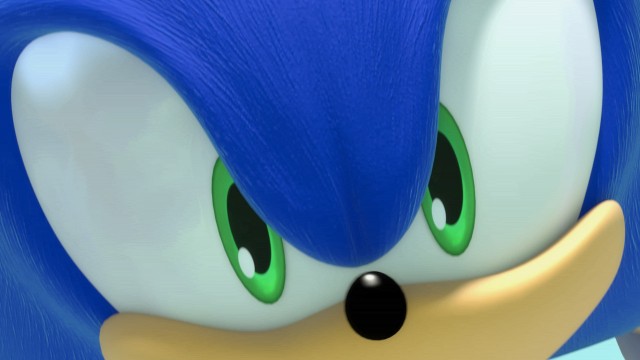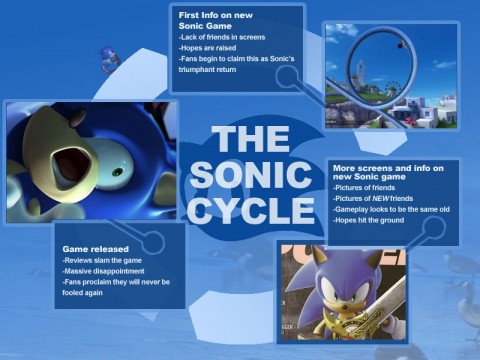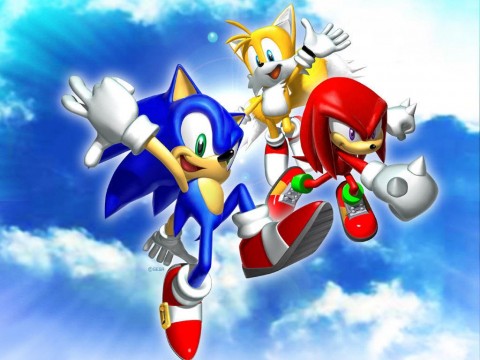
When Sega ceased production of Dreamcast in 2001, it marked the end of the company’s time as a hardware manufacturer. In the years that followed, Sega took its various series and franchises multiplatform, including its most famous, Sonic the Hedgehog. What should have been a smooth transition instead became one marred by diminishing returns. Whereas Nintendo’s Super Mario games adapted to the times and new hardware, Sonic seemed stuck in a perpetual state of flux. Each new game introduced unwanted gameplay hooks, missed opportunities, and the unspoken promise that next time, Sega would get it right. The years of disappointment resulted in something dubbed The Sonic Cycle, which is detailed nicely in the diagram below:

The Sonic Cycle has become almost prophetic to fans, seemingly predicting each game with brutal accuracy. The latest announced Sonic title, Sonic Boom, is already coming under fire by fans and critics, with apprehension toward the redesign of the characters, Western developers, and new gameplay mechanics. In other words, all the things that seem to signal imminent doom to the legions of Sonic naysayers of the world. Well, I think enough is enough; I’m here to dispel the myth of The Sonic Cycle, because the reality is that there have a been a heck of a lot more good than bad Sonic games in the years since Dreamcast!
There’s no denying Sega has had some misfires. 2006’s Sonic the Hedgehog remains an indelible mark on the franchise’s history, due in no small part to its wonky camera, merciless load times, and ludicrous story. A quick scan through Metacritic’s database, and Sonic the Hedgehog rests at a paltry 43 for PS3 and 46 for 360. Ouch. Yet, if one were to scan through the rest of Sonic’s aggregate scores for the past 13 years, they were more positive than negative. Nothing spectacular, of course, but a lot of averages in the 70s and 80s. Last I checked, 70s and 80s mean good games.
Not that a numerical score is the only indicator of a game’s quality. Everyone has those titles that they can’t help but play, regardless of the review scores. I personally had a lot of fun with DuckTales: Remastered, for example, and I’m loving Z.H.P. Unlosing Ranger vs. Darkdeath Evilman on my PSP, but neither of them won any game of the year awards. When I looked at all the Sonic titles I’ve played over the years, I kept thinking more and more that my experience didn’t jibe with all the hate everyone spews about the series nowadays. It was just too unbelievable that I was having that much fun if the majority of the games were genuinely awful.
The Sonic Advance trilogy on Game Boy Advance is a good place to start. Sonic was in the midst of his transition to 3D gameplay, so it had been a while since fans had gotten a proper, 2D adventure from the hedgehog. All three games were excellent returns to the style of play that made Sonic a household name on Genesis. In fact, until Sonic the Hedgehog 4, Nintendo’s handhelds were the only place to find traditional Sonic platformers. The trend continued on DS, where players were treated to Sonic Rush and Sonic Rush Adventure. Both placed the focus firmly on speed versus platforming, but the fine quality of the GBA games remained. Even Sonic Colors for DS, as short as it was, insured that Nintendo would get a second trio of fun Sonic games.

Sticking with the portables for a little longer, there’s no ignoring BioWare’s Sonic Chronicles: The Dark Brotherhood, which marked the franchise’s first foray into the world of RPGs. Super Mario RPG might be of a higher caliber, but it was an excellent title that further demonstrated that Sonic could be just as adaptable as Mario. The move to 3DS seems to be showing no signs of Sonic slowing, as Sonic Generations was a solid platformer (even if the two Sonics became almost indistinguishable by the end) and Sonic Lost World successfully brought a 3D Sonic game to a portable. Even Sonic’s mobile games, Sonic Dash and Sonic Jump, while derivative, are quality titles. The award for best Sonic portable game, though, goes to NeoGeo Pocket Color’s Sonic Pocket Adventure— it’s worth buying the handheld just to play!
On the home (console) front, Sonic had a tougher time, but there are plenty of hidden gems that were a lot more fun than their scores would have anyone think. Sonic Heroes was like all the good Sonic and Shadow stages of Sonic Adventure 2 rolled into an entire game. The three character gimmick wasn’t implemented as well as it could have been, but Heroes was still fast, fun, and looked sharp. On Wii, Sonic Colors finally dumped what had become a habitual need for play control gimmicks in favor of almost pure, unfiltered Sonic speed and platforming. As a bonus, the Wisps actually proved to be useful and felt like Sonic had found his own Fire Flower or Rainbow Star. Equal to Colors, Sonic Generations on PS3 and 360 was a love letter to everything that made Sonic’s current and past games work, mixing 2D and 3D gameplay with aplomb. Also, polarizing as they are, Sonic the Hedgehog 4 Episode I and II are more faithful evolutions of the Genesis titles than they’re credited for.
Even the more blatant offenders like Sonic Unleashed featured chunks of gameplay that shined (tell me those daytime segments didn’t put a smirk on anyone’s faces). I’d also be remiss if I forget to mention Sumo Digital’s Sonic & All-Stars Racing, with the most recent installment on Wii U, All-Stars Racing Transformed, being a truly fun and engaging experience. That brings us to Wii U’s vastly underrated Sonic Lost World, which introduced some fun, parkour-influenced play mechanics to the series. While the execution was sloppy in places, for the most part Sonic moved more smoothly and effortlessly than ever before. Now, we find Sega ready to unleash its newest reimagining of the series with Sonic Boom, which will use the video game as a prequel to the upcoming cartoon show. Nintendojo already did an excellent overview of what the early footage of the game has revealed, and to sum it up, there’s still hope for the game.
What this all means is that it’s okay to stop worrying that every Sonic game is going to be a disappointment, and instead go back to looking forward to them. Sega and Sonic Team have done some questionable things with Sonic, but I think it’s time that everyone stop pretending that so many of his games are outright awful. There have been a lot of wonderful Sonic titles that a lot of folks might have missed; look past the reviews and remind yourself why everyone came to love Sonic so much in the first place!




 ShareThis
ShareThis







Still as a character, he’s a shadow of his former self. Sonic used to be so COOL back in the day.
Pretty much all of the games in the past decade, even if they aren’t bad games, feature some really hokey dialogue and obnoxious characters. I hate Tails so much. Tails turned into a moron when he was granted a voice.
But I guess we can brush that aside. I just want more Sonic Generations, and less Sonic and the Secret Rings. Secret Rings was really bad. I paid full price for it in 2007.
It’s frustrating, in terms of his personality, because he really used to come across as cool, but now there’s too much corniness. Playing through the old Genesis games, Sonic, Tails, and Knuckles were silent and way more interesting. Weirdly, I can put up with the goofball antics in the Sonic comics (which are AWESOME).